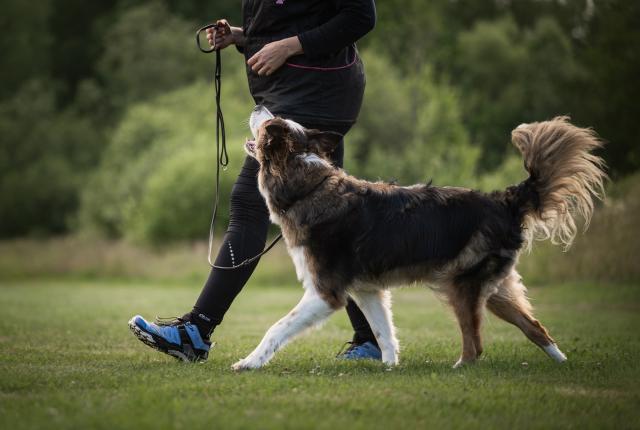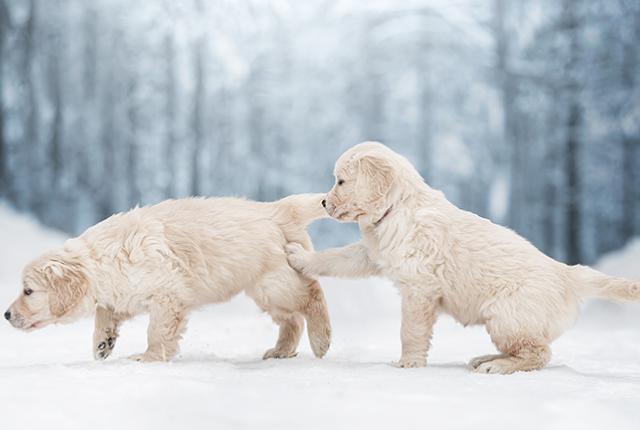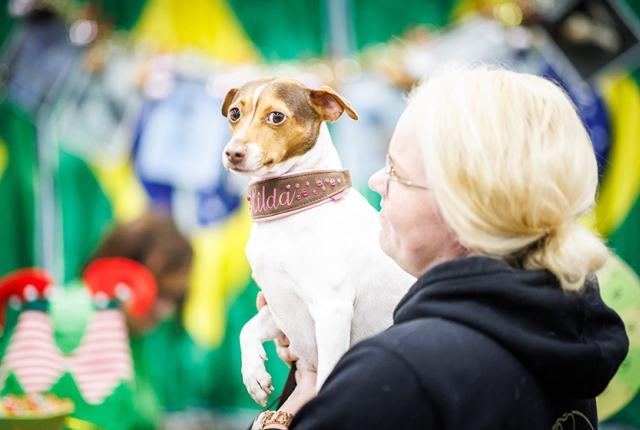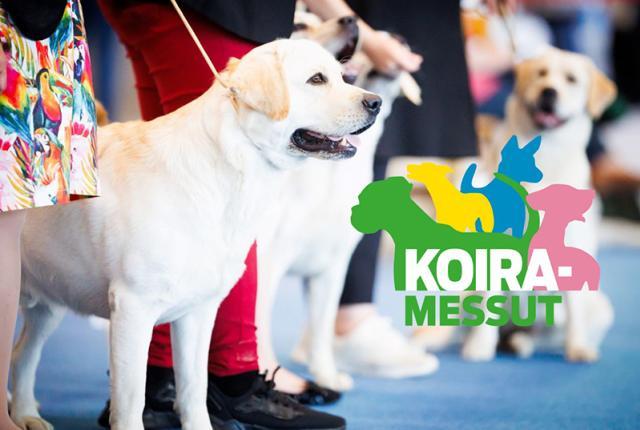As a dog owner, it is important that you take care of your dog's health and well-being. In addition to your dog's physical needs, make sure your dog has enough mental stimuli and has access to breed-appropriate activities. A good channel for this is different dog activities. The activities of the Finnish Kennel Club include about 70 different forms of trials, competitions and tests, which provide versatile opportunities for canine activities.
On this page, we have compiled information on how the dog's health and well-being should be taken into account in different forms of dog activities. More information about how the Animal Welfare Act outlines animal welfare in the activities can be found here.
Get to know your dog
The basis of your dog's health assessment is that you get to know your dog's daily habits. Knowing your dog's normal daily eating, moving and sleeping habits as well as their bowel movement will help you see when something is wrong.
Regularly monitor your dog's behaviour and movements. Problems such as limping, squinting, sudden tantrums or loss of appetite may indicate, among other things, pain. The reason for limping should always be determined. It may be a splinter in the paw, a wound or something more serious. If necessary, seek veterinary assistance.
Regular care supports the basic well-being of the dog
Basic dog well-being includes:
- Proper and sufficient nutrition. Obesity is the most common health problem in dogs.
- Regular examination and treatment of the eyes and ears.
- Dental care and regular brushing.
- Grooming and bathing. Unkempt fur can cause serious skin problems.
- Nail trimming. Overgrown nails cause pain and make it difficult for the dog to walk.
- Checking the dog's body and limbs for injuries, skin problems, etc.
- Regular deworming, if necessary.
- Vaccinations. The dog's vaccinations must be up to date in all dog activities under the Finnish Kennel Club in accordance with the vaccination regulations.
- Observation of the ectoparasite situation (for example, proper tick prevention).
An acute illness is not an obstacle for future activities
A dog that shows symptoms or is on medication cannot participate in trials, competitions, dog show activities, junior handler competitions or friend and reading dog activities under the Finnish Kennel Club.
Once the dog has fully recovered from an acute, short-term illness, such as stomach flu, toenail injury or wound, it can participate in activities. If you are unsure whether your dog is healthy, always ask your veterinarian.
With the exception of parasitic treatment, all medication is prohibited seven days before an activity event.
If the dog has been re-vaccinated while the old vaccination is still valid, there is no withdrawal period. In all cases, if the dog's vaccination has expired, the dog must be re-vaccinated before the event in accordance with the withdrawal period mentioned in the summary of product characteristics (usually 21–30 days). The dog is allowed to attend an event the day after the withdrawal period has expired, i.e. if the withdrawal period is 21 days, the dog is allowed to attend the event on the 22nd day after vaccination.
With a permit of exception, a dog can participate in activities run by the Finnish Kennel Club in the following situations:
- The dog has hypothyroidism, its medication is taken care of and the dog is in good health.
- Female dog on medication due to urinary incontinence.
- Dogs in need of cyclosporin therapy due to skin and eye disease.
- Dogs that require treatment with oclacitinib or lokivetmab for pruritus associated with atopic dermatitis and/or allergic dermatitis.
More information on anti-doping and applying for an exemption can be found here.
An angry dog is not welcome to participate in dog activities. Dog's aggressive behaviour at events under the Finnish Kennel Club will be reported to the Finnish Kennel Club, and the dog may receive a temporary ban from participating in events under the Finnish Kennel Club on this basis, or it may be excluded from events altogether.
A dog with a docked tail or cropped ears may not participate in dog shows, trials or competitions in accordance with Finnish legislation.
In addition to these, other, more specific restrictions on the conditions under which a dog may participate in the activity are listed in different dog activities.
The Finnish Food Authority has issued more detailed instructions on how animal welfare should be taken into account in animal competitions and shows.
Specific instructions for dog shows
A bitch who is pregnant may not participate in a dog show less than 30 days before the due date (due date = 63 days from the first mating) nor may a bitch who whelped participate less than 75 days after whelping.
A cropped or docked dog or a dog that has undergone a procedure in order to correct a defect or other characteristic that is considered a defect in the breed standard cannot participate in a dog show. A dog whose coat has been dyed or trimmed contrary to the breed standard in an attempt to conceal, for example, long hair or true coat quality, may not participate in a dog show.
The judges at dog shows are not veterinarians, but if they notice any abnormalities in the dog that may be related to the dog's health, they may direct the owner to take their dog to a veterinarian.
Junior handler activities are subject to the same general regulations as dog shows. In the case of a dog participating in the Junior Handler competition, special attention is paid to the dog's behaviour. The dog must be such that it can be safely handed to another competitor.
Separate regulations for trials, competitions and tests
A cropped or docked dog or a dog that has undergone a procedure in an attempt to correct a defect or other characteristic that is considered a defect in the breed standard may not participate in trials, competitions or tests.
A bitch who is pregnant cannot participate in an experiment, competition or test for less than 30 days before whelping, nor for at least 75 days after whelping. In the trial-specific rules, the restriction of the right to participate may also be longer than 75 days. Restrictions can be found in the rules of each type of trial or competition.
If the dog has a hearing or visual impairment such that it cannot cope with the test requirements, it should be excluded from the trial, competition or test.
The owner's responsibility is emphasised in ensuring the well-being of the dog in all activities
Responsibility as a dog owner requires that the risks that the activity poses to the dog's health are carefully assessed in all activities. Health problems are often reflected in the dog's behaviour. However, a dog is also skilled at hiding pain.
If any concerns arise about your dog's health and suitability for activities, you should always assess the situation with your veterinarian.




 PrimaDog
PrimaDog Agria
Agria